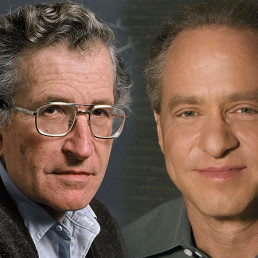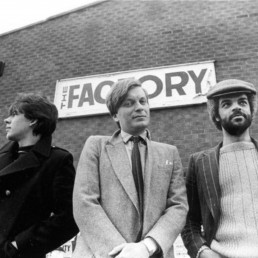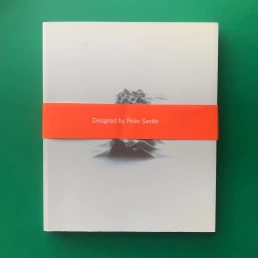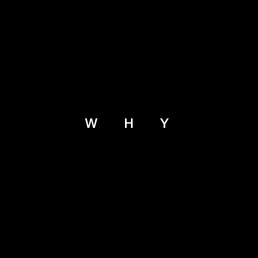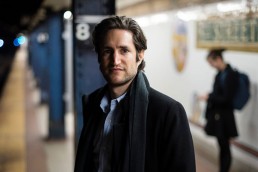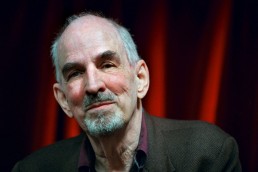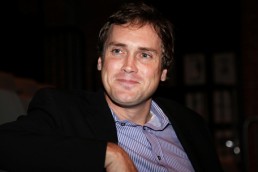AI, without the hype
Interviews with Ray Kurzweil and Noam Chomsky in which they nuance and debunk a lot of hype surrounding AI at the moment.
Fac 1, Factory Communications 1979-1992
Factory Records was a Manchester-based British independent record label founded in 1978 by Tony Wilson and Alan Erasmus.
The label featured several important acts on its roster, including Joy Division, New Order, A Certain Ratio, the Durutti Column, Happy Mondays, Northside, and (briefly) Orchestral Manoeuvres in the Dark and James. Factory also ran The Haçienda nightclub, in partnership with New Order.
Factory Records used a creative team (most notably record producer Martin Hannett and graphic designer Peter Saville) which gave the label and the artists recording for it a particular sound and image. The label employed a unique cataloguing system that gave a number not just to its musical releases, but also to various other related miscellany, including artwork, films, living beings, and even Wilson’s own casket and tombstone.
Two short clips about Factory artefacts
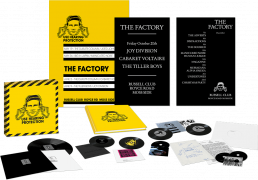
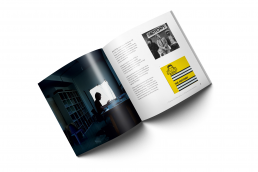
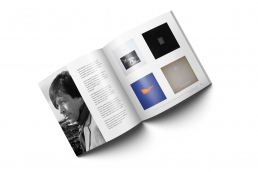

“I am not a piece of hash. I’m in charge of Factory Records. I think.”
Tony Wilson
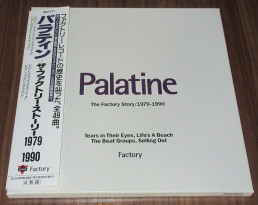

Fac 51, The Hacienda or How Not To Run A Club by Peter Hook - #update
The Hacienda: How Not to Run a Club by Peter Hook
The Haçienda was, as Hook says, in many ways the perfect example of how not to run a club – if you view a nightclub as a money-making business. But if, like the baggy trousered philanthropists Factory, you see it as an altruistic gift to your hometown and a breeding ground for the next generation of youth culture, it was, accidentally, purposefully, shambolically, anarchically, thrillingly, scarily, inspirationally, perfect.
Peter Hook is a founding member of Joy Division and New Order
See him talk about it.
See this short documentary about The Hacienda.
Why this selection?
This highly personal selection is about (business) ideas I think are worth seeing, reading, knowing and possibly spreading.
I think there can be learnt a lot from what other people say, do or make in business.
My selection focusses on art, fashion, science and pop culture but isn’t fashionable, trendy or scientific.
This website only costs money and time and never earned me a single euro (insert other currency here).
All copyrights of post which contain images, video, wiki text, etc. etc. belong to their respective owners.
However:
Visit my business site lukemac3000.com to see what I’ve done with business ideas.
Adam Alter - Irresistible
People have been addicted to substances for thousands of years, but for the past two decades, we’ve also been hooked on technologies, like Instagram, Netflix, Facebook, Fitbit, Twitter, and email—platforms we’ve adopted because we assume they’ll make our lives better. These inventions have profound upsides, but their appeal isn’t an accident. Technology companies and marketers have teams of engineers and researchers devoted to keeping us engaged. They know how to push our buttons, and how to coax us into using their products for hours, days, and weeks on end.
Tracing addiction through history, Alter shows that we’re only just beginning to understand the epidemic of behavioral addiction gripping society. He takes us inside the human brain at the very moment we score points on a smartphone game, or see that someone has liked a photo we’ve posted on Instagram. But more than that, Alter heads the problem off at the pass, letting us know what we can do to step away from the screen. He lays out the options we have to address this problem before it truly consumes us. After all, who among us hasn’t struggled to ignore the ding of a new email, the next episode in a TV series, or the desire to play a game just one more time?
“We live in an age of addiction — seemingly benign and otherwise — and Adam Alter, mixing the latest in behavioral science with briskly engaging storytelling, wakes us to an age-old problem that has found troubling new expression in the era of ubiquitous technology. You may never look at your smartphone in the same way again.”
—Tom Vanderbilt, author of Traffic and You May Also Like
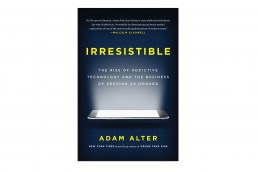
Check out this video to see him talking about the book
The Debunking Handbook, A must read for everyone in business or science
The Debunking Handbook
Stephan Lewandowsky (born 3 June 1958) is an Australian psychologist. He has worked in both the United States and Australia, and is currently based at the University of Bristol, UK, where he is the chair in cognitive psychology at the School of Experimental Psychology.[2] His research, which originally pertained to computer simulations of people’s decision-making processes, has recently focused on the public’s understanding of science and why people often embrace beliefs that are sharply at odds with the scientific evidence.
Get The Debunking Handbook here
The Debunking Handbook
John Cook is the Climate Communication Fellow for the Global Change Institute at The University of Queensland. He created the website Skeptical Science.com, which won the 2011 Australian Museum Eureka Prize for the Advancement of Climate Change Knowledge. In 2015, John was elected as a Fellow of the Committee for Skeptical Inquiry, who are selected for their ‘distinguished contributions to science and scepticism’. John co-authored the college textbook Climate Change Science: A Modern Synthesis and the book Climate Change Denial: Heads in the Sand. He won an award for Best Australian Science Writing for 2014, published by UNSW.
Get The Debunking Handbook here
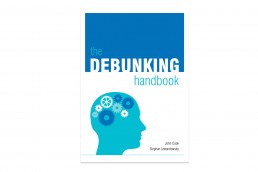
Trespassing Bergman - Film makers about the influence of Ingmar Bergman
Trespassing Bergman (re-edit from IMDB)
The idea of famous film makers on a pilgrimage to Ingmar Bergman’s Faro Island home is interesting.
Famous directors and actors who like to talk about the influences that shaped their own work and for whom Bergman represented one of the high achievers of their craft. The interviews Woody Allen playing it straight, Lars Von Trier getting laughs, Robert De Niro, who is notoriously awkward in interviews, at ease and making valid comment. To name but a few. Some music by The Radio Dept. one of Sofia Coppola’s (and my) favourite bands.
Check out the trailer and see the film if you’re interested in making a film yourself. Learn from the best in the industry.
Happyish - Starring Steve Coogan
About Happyish (from IMDB)
It is “different” and does not belong to mainstream and regular type of shows that one may watch. It is not a kind of show that is talked about around water coolers and it is not to everybody’s taste. It is not a kind of show that one watches for sheer purpose of entertainment. Not a kind of show that soothes you, either. It is more like a mirror that reflects how we could get lost in banality of life. It is thought provoking, witty, and intelligent. It is truthful, wry, honest, and cerebral. One of the best shows (sadly underrated and overlooked) in the so called “golden age of television”, that tries to touch the vexed question of “happiness” in modern world and address the “tragic sense of life” in a roundabout way and blended with humor.
Best quote:
‘It’s only tragedy when you don’t see the comedy.’
Hear writer Shalom Auslander talk about an episode in this clip.
The Greatest Movie Ever Sold - Morgan Spurlock
The Greatest Movie Ever Sold – Morgan Spurlock
A documentary about branding, advertising and product placement that is financed and made possible by brands, advertising and product placement.
Basically it’s post modern art that Marcel Duchamp would have loved.
Tom Vanderbilt - You May Also Like
You may also like, taste in age of endless choice.
Why we like the things we like, why we hate the things we hate, and what our preferences reveal about us.
With a voracious curiosity, Vanderbilt stalks the elusive beast of taste, probing research in psychology, marketing, and neuroscience to answer myriad complex and fascinating questions. Comprehensively researched and singularly insightful, You May Also Like is a joyous intellectual journey that helps us better understand how we perceive, judge, and appreciate the world around us.

Check out this video to see him talking about the book

